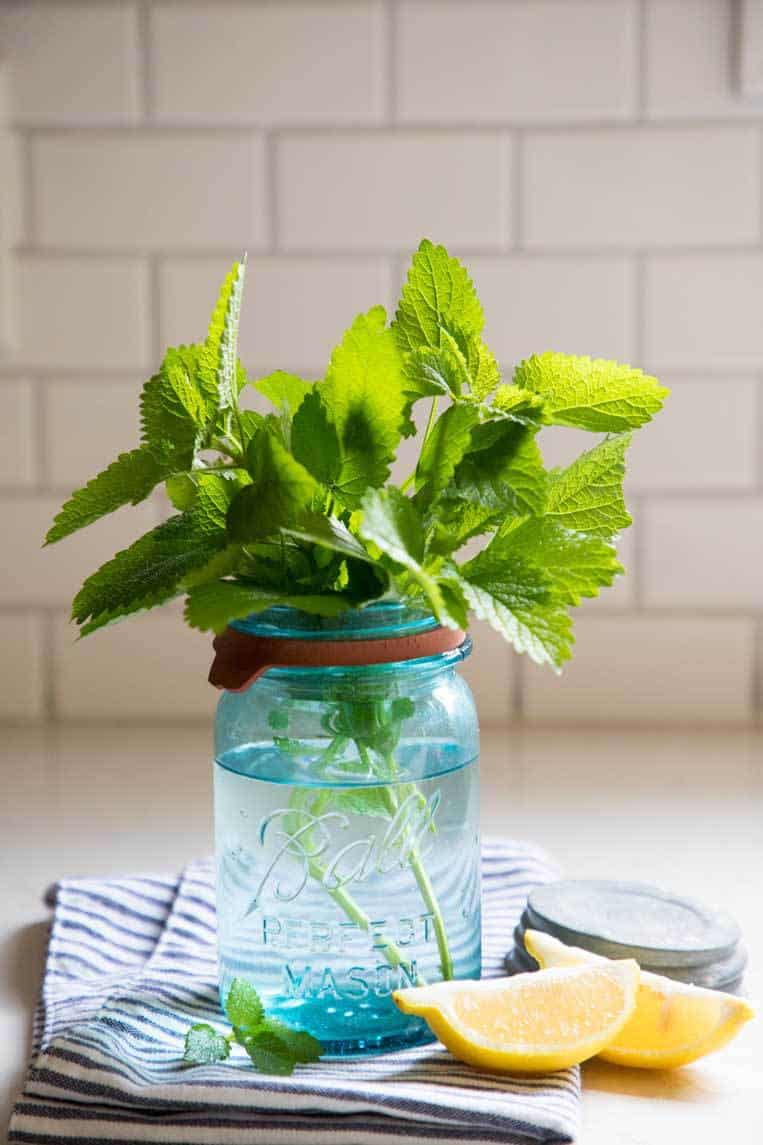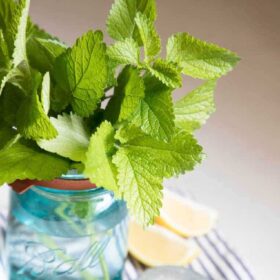14 Lemon Balm Benefits + Easy Tea Recipe
Lemon balm benefits the body in a spectrum of amazing ways, but it also carries risks. Discover how you can incorporate the bright flavor and support of lemon balm into your healthy living routine.

This post contains affiliate links.
I grow my own lemon balm here on the farm. It’s easy as pie to pull off. I use a jug sowing method in the spring to start my seeds and they come up really easily. From there, the perennial plant (which is a member of the mint family) grows and spreads on its own and will stay vigorous right up until frost.
Lemon balm is a wonderful container herb–if you don’t have space for it to spread in the ground, just put this little wonder in a pot.
But what does it actually do for you? More than you might realize!
**Of course, you should never start any herbal therapies until you talk to your doctor and get the green light. So make sure you do that first–especially if you have any health conditions or take prescription medications.**
Lemon Balm Benefits
- Lowers triglycerides–When used aromatically (that means you breathe it in) Melissa essential oil (which is lemon balm) has been shown to lower triglycerides which could impact a variety of other health conditions.
- Treats heart palpitations–Use caution if you plan to try lemon balm for any kind of heart rhythm issue, but studies have shown that lemon balm can help reduce episodes of palpitations in some people.
- Natural antibacterial–With its ability to fight a spectrum of bacteria inside the body, lemon balm has shown particular effectiveness against candida–a type of yeast that can cause brain fog, digestive issues, exhaustion and more.
- Treats diabetes–Primarily for type 2 diabetes, studies have shown that lemon balm extract or oil is beneficial in the reduction of blood sugar levels. It is not a replacement for insulin.
- Calms anxiety–Despite some studies from outside sources who conflict this statement, many people say that lemon balm benefits their battle with anxiety.
- Treats insomnia–Lemon balm is said to help calm and offers a mild sedating effect that promotes sleep.
- Improves cognitive function and focus–A study of young adults who took lemon balm internally found an improvement in mood and the ability to focus.
- Helps manage ADHD in children–Perhaps thanks to its calming effect, lemon balm reduces hyperactivity and impulsiveness and improves focus for some school children.
- Fights the herpes virus–Even though there’s no way to ever get the herpes virus out of your body, you can focus on preventing outbreaks and that means keeping the virus under control. For cold sore sufferers, lemon balm reduced outbreaks, duration and pain/itching. Plus there’s no viral resistance to the herb over time so it can be used repeatedly.
- Fights cancer–Lemon balm has been shown to cause cancer cell death in the deadly brain cancer called glioblastoma multiforme. It has also shown a positive effect on certain types of breast, liver, and some types of leukemia.
- Battles inflammation--Chronic inflammation can support a variety of diseases and trigger pain in the body. Lemon balm has shown to reduce inflammation throughout the body.
- Manages overactive thyroid–Known as Grave’s Disease, lemon balm stops certain substances that trigger the thyroid from binding to receptor cells and helps slow down an over active thyroid.
- Soothes constipation–Studies are still being done but early research shows that lemon balm, peppermint and angelica root may be helpful treatments for constipation.
- Reduces PMS symptoms–When taken in a capsule form, lemon balm reduced those pesky mood swings, weight gain and bloating in high school age women.
When to use caution with lemon balm
Just because you can grow it, certainly doesn’t mean lemon balm benefits everyone. You should avoid lemon balm if you have a hypothyroid because it can negatively effect your thyroid medications.
Some people have had allergic reactions to lemon balm ranging from anaphylactic responses and rashes. Use caution if lemon balm is new to you.
And of course, if you are nursing or pregnant ask your doctor before you start using lemon balm.

Where to buy lemon balm
This part can get so very tricky. Always make sure you are buying oils from reputable brands like DoTerra or Young Living. Remember you’re looking for Melissa. A little goes a very long way and while it is expensive, you don’t want to use a brand that may have additives or sketchy ingredients. Lemon balm benefits can only be as good as the source you get them from.
For a capsule, you may consider one like this:
If you’d like to know more about dosages, you can check this post.
How to make lemon balm tea
I love my lemon balm tea–and while my recipe isn’t very scientific, it’s delicious and I enjoy a steaming cup several times a week and it never seems to make me feel sleepy. Even my kids enjoy it!

Lemon Balm Tea
Ingredients
- 1/4 cup fresh lemon balm leaves chopped
- 1 cup water
- 1 teaspoon raw honey optional
Instructions
- Chop the lemon balm leaves to release their oils. Set aside.
- Heat the water in a cup in the microwave or on the stove until boiling.
- Mix the leaves and water in a mug and allow to stand 10 minutes to steep.
- Stir in honey and strain if desired. Drink warm.
Nutrition
You can certainly enjoy lemon balm fresh on salads, or in your favorite recipes, too. Be brave! Experiment with its bright flavor.









Is it just as good for you if you make the tea using the dried leaves
Yes dried leaves are great if they have been dried to preserve the natural oils. –Rachel
@Rachel Ballard, can you expand on best practices for drying herbs to preserve as much of their essential oils as possible? Thanks!
Yes Katie, you can follow this post: https://feastandfarm.com/how-to-dry-parsley/ It covers the basic steps for any herbs. –Rachel
I am in thyroid medication. Can I safely consume lemon balm?
Sue I can’t give you any medical advice, I’m sorry. You’ll need to ask your doctor or a qualified medical professional about that. –Rachel
I’m about to try the tea on a friend’s gout pain. Fresh out of aspirin, ibuprofen, & tylenol so now is the time. Hope it works! I’ll let you know soon.
Well I hope it will help maybe in time Janice. One thing about natural remedies–they don’t all give us instant results. –Rachel
I’ve planted lemon balm in my garden as I have always loved the tea. However, while the tea smelled beautiful, it was completely tasteless. I wonder if breaking up/chop the leaves will make a difference. Could the amount make a difference too? How many leaves would you say takes to make a cup? THanks!
Crushing them a bit will certainly help release the oils and when the leaves were harvested also matters for taste. Try to get them first thing in the morning when the oils are most fresh. And leaves to make a cup? Of tea or just measuring leaves? If you are packing a cup with just fresh leaves I’d say 40 maybe? –Rachel
I’ve just made tea with it for the first time. It’s delicious hot but I’d like to make a batch and refrigerate it for hot days. I’m guessing it would be very refreshing. Shall I report back?
Of course!
I add this beneficial herb in the mix when making ricotta gnocchi – fresh from the garden.
That sounds lovely Mike!
Is 1/4 cup “loosely packed” or more densely packed? I’m new to this, thanks!
I’d call it loosely packed Laura. –Rachel
I like to make hot tea and then let it cool off to make iced tea. I leave it in the fridge for upto a week. I also keep it in a jar of water next to my computer so I can pinch it, smell it and feel more awake!
I love the smell too– and iced tea would be a great idea Nancy!
I am new to herb gardening. Lemon balm is one of the herbs I am growing. One of my daughters-in-law is going to dry lemon balm and other herbs for cooking and for tea. I was excited to learn I could make tea from the fresh leaves, and possibly lower my triglycerides. But, not recommended for persons with hypothyroid. Actually, I have had very high triglycerides common to my Hashimoto’s Thyroiditis. So much for the lemon balm tea. I was looking forward to trying it also to learn if I could benefit from its anti-inflammatory properties to minimize my interstitial cystitis flares.
I have Hashi’s as well Deborah and while I love lemon balm we have to treat it with respect–as we do all herbs. Their medicinal value is great but we have to also understand their risks and in this case your thyroid needs will have to over ride using lemon balm unless your doctor gives you the okay. –Rachel
I use Lemon Balm when cooking fish! It adds such a mild lemon flavor!
That’s wonderful Angie!